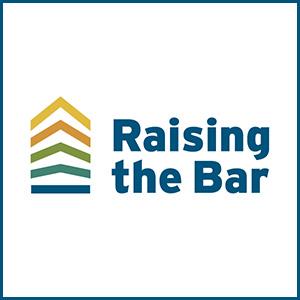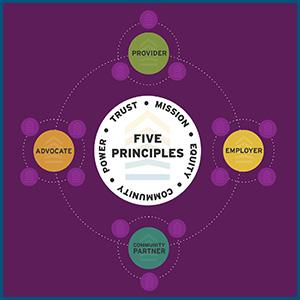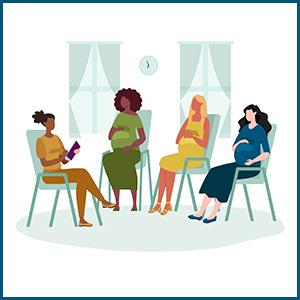
Why This Project?
All childbearing families should be able to access the resources they need to be healthy and thrive, including high quality and affordable healthcare. Factors like where they live, their racial and ethnic background, or their income simply should not matter. Healthcare institutions that provide maternity care have a decisive role in changing the trajectory of our country's generations-long maternal mortality and morbidity crisis.
What Is Optimal Maternal Health?
Optimal maternal health is rooted in good health before pregnancy, anchored in healthy communities and families, and enabled by health-supporting structures, policies, programs, and practices. It requires dismantling the toxic effects of all levels of racism, physical and emotional abuse, and other oppressive structural inequities and forms of bias. Achieving optimal maternal health requires truly accessible, high-quality, affordable, culturally congruent, and comprehensive health care, in addition to solving the broader structural inequities that undermine health.
Optimal maternal health requires reproductive justice. This means every person has the right to decide when or if to become pregnant or continue a pregnancy. It also means they can determine the conditions under which they will birth and create a family. It also means each family has all the necessary social support systems, including a safe environment, a healthy community, and without fear of violence from individuals or the government. The statement grounds the development of a comprehensive plan for healthcare organizations to advance maternal health equity and excellence.
We thank Sister Song and the many Black women leaders who have worked to create, refine, and promote the Reproductive Justice framework, which was foundational to the work of the Expert Advisory Group in developing this definition of optimal maternal health.
How we did it
Success requires working collaboratively with diverse stakeholders, including those working on the ground with the communities most impacted by the crisis. We partnered with the National Birth Equity Collaborative, the Alliance of Community Health Plans, the Health Care Transformation Task Force, and with members of an Expert Advisory Group who reflect a broad range of maternity care system experiences and areas of expertise.
Through our Expert Advisory Group, we worked closely with experts from the Black, Diné and Indigenous, Chicana, and Asian reproductive and birth justice movements and leaders working on Medicaid; rural health; quality improvement; perinatal mental health; community engagement; disability, public health; social services; and obstetrics, midwifery and maternity nursing. They work in a wide range of entities, including in healthcare provider institutions (e.g., medical centers, hospitals, federally qualified health centers, and birth center settings), health plans, professional associations, perinatal quality collaboratives, community-based and other non-profit organizations, and different branches of state government.
Expert Advisory Group Members
We are extremely grateful for the commitment and dedication of our Expert Advisory Group members:
- Alise Powell, Senior Policy Analyst, National Birth Equity Collaborative
- Eva Powell, Associate Director, Clinical Innovation & Megan Knauss, Clinical Innovations Program Manger, Alliance of Community Health Plans
- Tanya Alteras, Senior Director & Joshua Traylor, Senior Director, Health Care Transformation Task Force
- Angela Aina, Co-Founder and Executive Director, Black Mamas Matter Alliance*
- Mary Applegate, Medical Director, Ohio Department of Medicaid
- Lily Bastian, Midwifery Clinical Practice Advisor, American College of Nurse-Midwives* (representing American College of Nurse-Midwives)
- Allison Bryant, Senior Medical Director for Health Equity, Mass General Brigham, Associate Professor of Obstetrics, Gynecology and Reproductive Biology at Harvard Medical School (representing American College of Obstetricians and Gynecologists)
- Micaela Lara Cadena, New Mexico House of Representatives
- Edith L. Combs, Nurse Manager, Women's Health Services, Henry Ford Health (representing the Association of Women's Health, Obstetric and Neonatal Nurses)
- Andria Cornell, Associate Director for Women's and Infant Health, Association of Maternal & Child Health Programs
- Julia Joseph-DiCaprio, Senior Vice President and Chief Medical Officer, UCare*
- Erin Gildner, Associate Director, Equitable Maternal Health Coalition, March of Dimes* & Director, Chapter Relations United Spinal Association
- Dawn Godbolt, Policy Director, National Birth Equity Collaborative*
- Nicolle Gonzales, Founder and Medical Director, Changing Woman Initiative
- Rachel R. Hardeman, Associate Professor and Blue Cross Endowed Professor of Health and Racial Equity, Division of Health Policy and Management, University of Minnesota School of Public Health and Rural Health Research Center*
- Michelle Hinton, Director of Impact, Population Health and Well-Being, Alliance for Strong Families & Communities
- Karen Jefferson, Director, Midwifery Practice and Education, American College of Nurse-Midwives (representing American College of Nurse-Midwives)
- Karen Johnson, Director, Change in Mind Institute, Social Current
- Elliott Main, Medical Director, California Maternal Quality Care Collaborative, Clinical Professor, Department of Obstetrics and Gynecology, Stanford University School of Medicine
- Ebony Marcelle, Director of Midwifery, Community of Hope
- Kay Matthews, Founder, and Executive Director, Shades of Blue Project
- Drishti Pillai, Director of Immigrant Health Policy, National Asian Pacific American Women's Forum*
- Miamon Queegley, Manager of Community Engaged Research and Outreach, Center for Anti Racism Research for Health Equity
- Kalpana Ramiah, Vice President of Innovation, Director of Essential Hospitals Institute, America's Essential Hospitals
- Jennifer Wang, Deputy Director of Programs, National Asian Pacific American Women's Forum*
- Kristina Wint, Program Manager, Women's Health, Association of Maternal & Child Health Programs*
*Organizational affiliations at the time of participation
Supported by the Robert Wood Johnson Foundation. The views expressed in this report do not necessarily reflect the views of the Foundation.
“Indigenous families bear a disproportionate burden of adverse maternal and infant health outcomes. Raising the Bar for Maternal Health is a roadmap for institutions seeking to provide exemplary maternity care, build trusted community partnerships, and center community leadership in solutions that better meet the needs of all childbearing families.”
— Nicolle Gonzales, CNM, Expert Advisory Group Member





